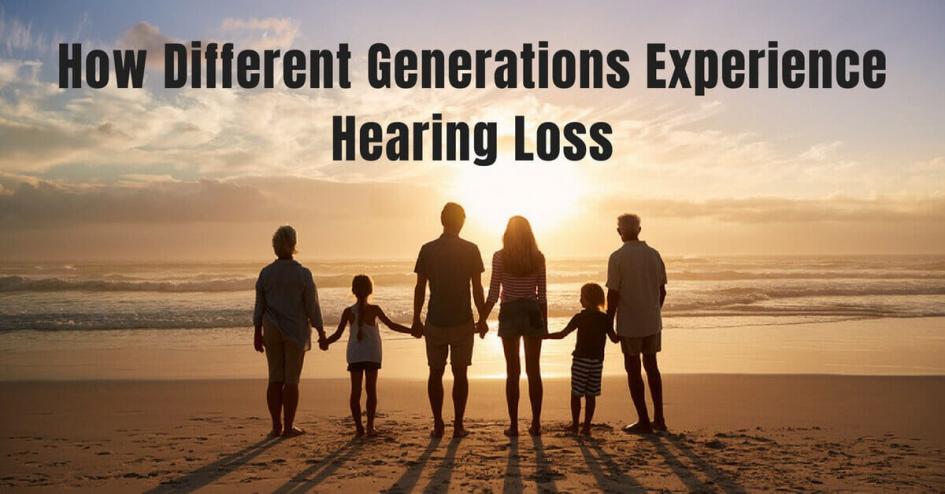
How Different Generations Experience Hearing Loss
You have probably felt it between yourself and your parents, your children or both: the generation gap. It’s true that the unique combination of social, historical, and economic circumstances that you are born into can shape the way you--and people in your demographic--see the world. And that outlook may be very different from the generation that came before you. In terms of hearing loss, however, it seems that we are all more alike than we know. The same factors that determine your hearing health, such as your lifestyle, exposure to noise, and the age of your ears, decide your parents’ and children’s hearing health as well. That said, the world events and environmental influences that are unique to each generation may affect how great a role those deciding factors--like noise exposure--play in the future health of a person’s ears. Read on to find out more.
The Greatest Generation: 1901-1945
Noise-induced hearing loss
Whether working in factories or fighting on battlefields during WWII, members of the ‘Greatest Generation’ made incredible sacrifices during this key moment of our history. They also suffered significant noise-induced hearing loss from their constant exposure to loud noises.
Age related hearing loss
Hearing loss that is a natural result of aging, also known as presbycusis, happens gradually and progressively. From the age of 65 onwards, many people can expect to have noticeable hearing loss. As the youngest of this generation would be 73 years old, their hearing abilities have probably decreased as a result of aging, and in some cases, noise-related damage that occurred earlier in their lives.
Baby Boomers: 1946-1964
Noise-induced hearing loss
In Western countries, birth rates spiked substantially following World War II, a phenomenon that led to the term Baby Boomers. These are the children who would grow up to become part of a massive counterculture youth movement that spread a tide of change across the globe. The ‘peace and love’ generation also saw the birth of Rock and Roll, which is partially to blame for the noise-induced hearing loss affecting Boomers today. Although this generation did not suffer the same kind of occupational noise-induced hearing loss as their parents, those blasting Rolling Stones anthems certainly did some damage.
Advances in hearing aids
As the stream of social awareness was progressing, so was hearing aid technology. Transistor hearing aids became smaller, had less distortion, and required less battery power than vacuum tube hearing aids. Baby Boomers may have been too young to use the transistor hearing aid developed in 1948, but thanks to their hard work and persistence, this technology was perfected.
Generation X: 1965-1983
Hearing loss linked to health issues
Between the Baby Boomers and the Millenials we have Generation X. Born in a time of shifting societal values, Generation X-ers have been labeled cynical, but research describes them as leading active and happy lives in their middle age. The rise of health issues such as obesity, diabetes and heart disease played a role in this generation’s hearing loss. But with a growing understanding of how our overall health affects our hearing health, we began to make major inroads towards improving both.
Advances in hearing aids
In 1975, the six-channel hearing aid was created by Daniel Graupe, and the first digital hearing aid made its entrance in 1982, at City University of New York. Since that time, digital hearing technology has continued to provide hearing solutions for people with hearing loss, across all age groups.
Generation Y (Millennials) 1984-2004
Noise-induced hearing loss
Unsurprisingly, Generation Y has been shaped by the unprecedented amount of technological innovation and the wide availability of information and entertainment in the world today. This generation, with its ubiquitous personal music players and earbud headphones, may be the most at risk for developing noise-induced hearing loss. Parents are becoming more vigilant about monitoring volume levels and educating their children about safe listening practices. Hearing loss prevention and awareness is a pressing issue for educators and hearing health professionals throughout the world.
Hearing loss can affect anyone
No matter your age, your experiences or your outlook on life, untreated hearing loss can present communication difficulties at work and in your personal relationships. Fortunately, hearing aids can help to restore normal communication for people of all ages. If you have noticed any irregularities with your hearing, make an appointment with us at House of Hearing today. Help is just a phone call away.make an appointment with us at House of Hearing today
Our Clinics
All House of Hearing clinics are in town centre locations and accessible to public transport and parking. Home visits also available if mobility is an issue.


.png)
.png)
.png)

.png)
